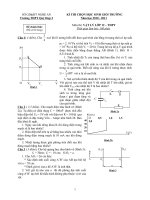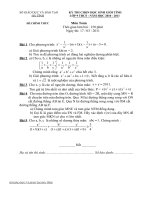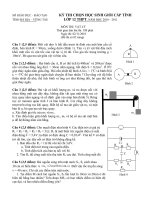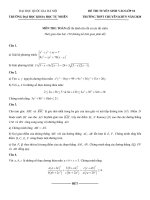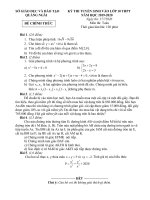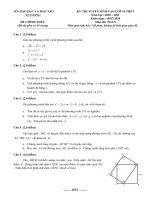Đề thi chọn HSG tỉnh môn Anh năm học 10-11.có đáp án
Bạn đang xem bản rút gọn của tài liệu. Xem và tải ngay bản đầy đủ của tài liệu tại đây (127.91 KB, 9 trang )
SỞ GIÁO DỤC VÀ ĐÀO TẠO HÀ TĨNH
ĐỀ CHÍNH THỨC
KỲ THI CHỌN HỌC SINH GIỎI TỈNH LỚP 9
NĂM HỌC: 2010 - 2011
MÔN: TIẾNG ANH
THỜI GIAN LÀM BÀI: 150 PHÚT
Lưu ý: Thí sinh làm bài vào tờ giấy thi
Đề thi gồm 7 trang
A. PHONETICS
I. Select A, B, C or D only to indicate the word whose bold and underlined part is
pronounced differently from the rest in the following questions of 1 to 5.
1. A. thin B. thick C. this D. think
2. A. onion B. coffee C. lot D. what
3. A. shi r t B. po r k C. wo r ld D. unive r sity
4. A. height B. eight C. weight D. freight
5. A. greet B. again C. arrange D. gold
II. Select A, B, C or D only to indicate the word whose stress pattern is different from
the rest in the following questions of 6 to 10.
6. A. education B. community C. development D. unbreakable
7. A. prepare B. repeat C. purpose D. police
8. A. literature B. entertainment C. recreation D. information
9. A. chocolate B. structural C. important D. national
10. A. cinema B. position C. family D. popular
B. LEXICO-GRAMMAR
I. Choose the best option A, B, C or D to complete the following questions of 11 to 20.
11. Of course, all those who ____________ can apply again.
A. have not listed B. didn’t list C. will not list D. have not been listed
12. Mary wishes she ______________ her uncle this coming weekend.
A. will visit B. had visited C. visits D. could visit
13. _______ the beginning of the story the two main characters meet in the lift.
A. At B. On C. To D. In
14. The book contained a lot of ____________ about how little petrol the car used.
A. examination B. fact C. news D. information
15. She said I _________ learn harder ___________ pass the exam.
A. had/in order to B. should/so as to C. must/in order D. will/so as to
16. The sun gives ______________ vast amounts of gases.
A. off B. on C. up D. down
17. There’s no ______ fixing that toy. He’ll just break it again.
A. point B. worth C. harm D. good
1
18. I have three brothers, _____________ are businessmen.
A. that all of them B. who they all C. all of whom D. who all of them
19. It is important that he ____________ with Dr. Baker immediately.
A. speak B. spoke C. will speak D. speaks
20. When the visitors arrived, the company gave them the ___________ carpet treatment.
A. blue B. red C. orange D. green
II. Complete the following questions from 21 to 30 with the correct preposition.
21. Actors have to learn their lines ____________ heart.
22. Is Nurse Smith ___________ duty tonight?
23. Coffee shops will always be popular ____________ retired people.
24. It’s typical ____________ Jim to forget his keys.
25. ____________ my astonishment, I won $1,000.
26. Plans for the trip are still ___________ discussion.
27. We’re ____________ schedule, so hurry up!
28. The injured man had to be taken to hospital ____________ delay.
29. Schools in Vietnam are different ____________ those in the USA.
30. I’m going to treat myself _____________ an ice-cream when I’ve finished work.
III. Fill the blanks from 31 to 40 with the right form of the CAPITAL words provided
in the right column.
Learning a foreign language
Most people have the (0.) ability to learn a foreign language.
They simply need constant (31.) ______ in order to overcome
their fears. (32.) ______ seems to be the most difficult aspect
for some students, while for others it is the (33.) _______ of
the spoken words. This feeling is not (34.) _______ to those
who feel least (35.) _______, as even the most outgoing
students are sometimes (36.) _______ to speak. One reason
for this reluctance may be (37.) _______. Students may be
(38.) ______ of their accent. We could say that the root of this
problem might be the student’s desire for (39.) ________ but
no one can have perfect (40.) _______ without practice.
0. ABLE
31. ENCOURAGE
32. CONVERSE
33. COMPREHEND
34. EXCLUDE
35. CONFIDENCE
36. RELUCTANCE
37. SHY
38. SHAME
39. PERFECT
40. PRONOUNCE
IV. Complete the following questions from 41 to 50 with the right from of the verb
given in brackets.
41. From the clink of dishes one can tell that supper __________ (prepare).
42. If you _________ (not change) your wet clothes, you may catch a cold.
43. Mrs. Brown came to inform her that dinner _________ (serve) already.
2
44. His phrase was greeted by a strange laugh from a student who ________ (sit) near the
wall.
45. The house where the robbery took place is guarded by the police to prevent it from
_____________ (enter).
46. Anne has not seen Harry since the party _____________ (seat).
47. - You have just missed the bus.
- All right. I ____________ (walk)
48. This time next week, I ______________ (lie) on a beautiful beach in Miami.
49. You have read this book already? What you ___________ (think) of it?
50. They (get) _____________ married, but in the end they changed their minds.
C. READING COMPREHENSION
I. Complete the following passage by choosing the best option, A, B, C or D for
questions from 51 to 60.
Energy Saving
Saving energy doesn’t have to be expensive or time consuming. But what can you do to
save energy? There is (51.) _____________ that you can do to help the process of energy
conservation. You can save energy by doing things like making sure that the kettle doesn’t
(52.) ______________ more water than is needed, always washing a full load in the washing
machine rather than a half load or turning down your central heating by 1oC – this could cut
your (53.) __________ bill by 10%.
Making sure that hot water taps are not left (54) __________ and replace washers if your
taps drip. (55.) __________ work you can turn off (56.) _____________ lights and your
computer if you are not using them. (57.) ___________ to energy saving light bulbs – these
use around a quarter of the electricity, and often last eight times (58.) __________ than an
ordinary bulb. Close your curtains at (59.) __________ to keep the warm air from escaping
through the windows. Switching off (60.) __________ appliances when they are not in use
makes a big contribution to energy saving too.
51. A. plenty B. lot C. little D. few
52. A. consist B. contain C. compose D. include
53. A. hot B. heat C. heating D. heated
54. A. run B. ran C. running D. flowing
55. A. By B. At C. In D. On
56. A. any B. all C. those D. no
57. A. Change B. Consume C. Buy D. Sell
58. A. higher B. shorter C. less D. more
59. A. morning B. evening C. dusk D. afternoon
60. A. electricity B. electronic C. electric D. electrical
3
II. Read the following passage and answer the following questions from 61 to 70 by
choosing one answer A, B, C or D only.
Students read for a variety of reasons, but probably the most important reason students
read is to gain academic knowledge. Their goal is to learn and comprehend what they read.
To be successful, they must develop certain reading skills. However, some students meet
difficulty in comprehending and processing information taught by their teachers. This may be
for a variety of reasons. Often it is that they have never developed the proper learning
strategies necessary for comprehension. Therefore, their ability to read, learn, memorize and
recall information is impaired. Students then become discouraged from learning. There are,
however, a number of effective measures for those with reading comprehension difficulties.
Visual
Students respond well when oral or written information is presented to them in a visual
way. For example, when a skill or topic is both described and demonstrated at the same time,
it provides students with the means to associate the demonstration with the description. When
students are provided with a combination of visual, written and oral instruction, they can
better comprehend and process the information.
Participation
Passive listening and reading often result in the inability to process information because
students are not engaged or stimulated. One of the best remedies for this is for students to
participate in the topics they read about. Teachers can ask students to demonstrate what they
have learned, and give them feedback and praise.
Thinking Aloud
Students are encouraged in reading comprehension skills when they "think aloud." The
think-aloud strategy helps them to vocally express the material they are reading or the subject
they are learning about. It helps if students go through each step or take the subject one step
at a time. Talking while they think helps them to verbalize and better process the
information. Students can move from thinking aloud to whispering softly, and eventually
they will no longer require thinking aloud to comprehend. This is a gradual process that
equips students with the ability to think and process silently through a series of gradual
techniques.
Practice
Practice will help students give meaning to what they have been hearing or reading. Once
the teacher has provided them with the information, students can demonstrate what they have
learned through homework and in-class assignments. It is up to the teacher to assess the
difficulty of these assignments for students. Start off with easy assignments to complete so
students are encouraged, then gradually increase the complexity and difficulty over time.
4
Encourage students to read over their work and process what they have read to ensure they
are grasping all the pertinent information.
61. Which of the following is true of readers who are reading to gain academic knowledge?
A. Reading increases their alertness.
B. Their goal is to learn and understand the materials they are reading.
C. They physically learn what they are reading.
D. They read for a variety of reasons.
62. The phrase ‘a variety of reasons’ in the passage is closest in meaning to _______.
A. some reasons B. few reasons C. many reasons D. no reasons
63. The word “goal” in the passage is closest in meaning to _______.
A. score B. desire C. guide D. choice
64. Many students have difficulty in reading comprehension because ______________.
A. they do not have enough time to read
B. they haven’t practiced reading enough
C. they do not have the appropriate approaches to reading
D. they do not have the right attitudes
65. In helping students better comprehend the reading, visual reading _________________.
A. combines the oral, visual and written information
B. associates the meanings with the descriptions
C. processes the information for students
D. provides a description of the learning process
66. One possible reason why students do not read well is that ___________________.
A. they can not visualize the information
B. they listen and read passively
C. they cannot demonstrate what they have read
D. they do not receive praise and feedback from teachers
67. Thinking aloud is a ________________.
A. quick and noisy process of comprehension
B. step by step process towards reading
C. conversational method of reading comprehension
D. process in which students express their thoughts in spoken words
68. One advantage of thinking aloud is ______________.
A. students do not have to write down their thoughts
B. students’ ability to think and process information silently is developed
C. students can whisper softly in this technique
D. students can talk while studying in class
69. In order to demonstrate students’ comprehension, ________________.
A. homework and in-class assignments should be given
B. students must hear and read the information well beforehand
5
C. the tasks’ level of difficulty must be maintained consistently
D. all the related information must be provided
70. It can be inferred that in order to improve students’ ability in reading _____________.
A. only one technique is enough
B. the teachers have to work very hard
C. the students have to read a lot
D. one technique is not enough, a combination is recommended
III. Read the following passage and complete the numbered blanks from 71 to 80 with
one suitable word only.
Valentine is celebrated on (71.) _________ February 14. It is a festival (72.) __________
romantic love as many people give cards, letters, flowers or presents to their lover. They may
also arrange a romantic (73.) ___________ in a restaurant. People who would like to have a
romantic relationship with somebody may use the occasion to make (74.) ___________
known, often anonymously.
Valentine's Day is not a public holiday. Government offices, stores, schools and other
organizations are (75.) ___________ as usual. Public transit systems run on their regular
(76.) ________. Restaurants may be busier than usual as many people go (77.) ___________
for an evening with their spouse or partner. Valentine's Day is also a very (78.) __________
date for weddings.
The most (79.) ___________ Valentine's Day symbols are the heart, particularly in reds
and pinks, and pictures or models of Cupid. Cupid is usually portrayed as a small winged
figure with a bow and arrow. In mythology, he uses his arrow to strike the hearts of people.
People who have (80.) ___________ in love are sometimes said to be 'struck by Cupid's
arrow.
D. WRITING
I. Choose the underlined word or phrase in each sentence that needs correcting.
81. I’m very glad that you’ve done lots of progress this semester.
A B C D
82. Every Sunday, the Petersons eat bacon and eggs of breakfast.
A B C D
83. When the man crossed the street, he did notice that the traffic light has turned green.
A B C D
84. There was wind and snow outside, but he could not see far at all.
A B C D
85. Dresses, skirts, shoes, and children’s clothing are advertised at great reduced prices this
A B C D
weekend.
6
II. Rewrite the sentence so that it has the same meaning as the first given.
86. I had expected the weather to be worse.
The weather was ________________________________________.
87. The train couldn’t run because of the storm.
The storm prevented ____________________________________________ .
88. She never seems to succeed, even though she works hard.
Hard _______________________________________________________ .
89. The storm blew the roof off the house.
The house _____________________________________________________.
90. Vitamin intake and intelligence are not connected.
There is _____________________________________________________ .
III. It is widely recognized that we have to protect the environment, not only for our
own sake but for our next generations’ as well. Write a composition of around 200
words to say what you would and would not do in order to keep the world
unpolluted, fresh and green.
_______________________________________________________________________
_______________________________________________________________________
_______________________________________________________________________
_______________________________________________________________________
_______________________________________________________________________
_______________________________________________________________________
_______________________________________________________________________
_______________________________________________________________________
_______________________________________________________________________
_______________________________________________________________________
_______________________________________________________________________
_______________________________________________________________________
_______________________________________________________________________
_______________________________________________________________________
_______________________________________________________________________
_______________________________________________________________________
==== The End ====
7
ĐÁP ÁN VÀ BIỂU ĐIỂM
A. PHONETICS
I. 1. C 2. A 3. B 4. A 5. C
II. 6. A 7. C 8. A 9. C 10. B
B. LEXICO-GRAMMAR
I.
11. D 12. D 13. A 14. B 15. B 16. A 17. A 18. C 19. A 20. B
II.
21. by 22. on 23. with 24. of 25. To
26. under 27. behind 28. without 29. from 30. to
III.
31. encouragement 32. Conversation 33. comprehension 34. exclusive
35. confident 36. reluctant 37. shyness 38. ashamed
39. perfection 40. pronunciation
IV.
41. is being prepared 42. do not change
43. had been served 44. was sitting
45. being entered 46. were seated
47. will walk 48. will be lying
49. do (you) think 50. were going to get
C. READING COMPREHENSION
51. A 52. B 53. C 54. C 55. B
56. A 57. A 58. D 59. C 60. D
61. B 62. C 63. B 64. C 65. B
66. B 67. D 68. B 69. A 70. D
71. every 72. of 73. date/
meal
74. it 75. open
76. schedule 77. out 78. popular 79. common 80. fallen/
been
D. WRITING
I.
81. B 82. D 83. D 84. B 85. D
II. Rewrite the sentence so that it has the same meaning as the first given.
8
86. The weather was not so/as bad as I had expected.
87. The storm prevented the train from running.
88. Hard as/though she works, she never seems to succeed.
89. The house got/had its roof blown off by the storm.
90. There is no connection between vitamin intake and intelligence.
III.
Essays are assessed according to the following criteria: idea; coherence and cohesion;
syntax, spelling and vocabulary.
9
